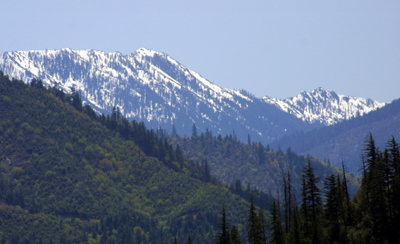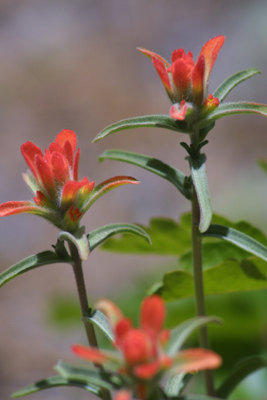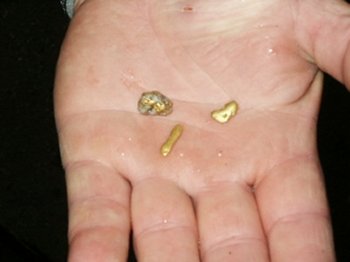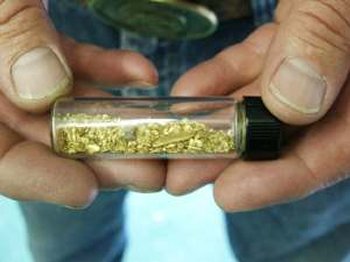BY JOSEPH F. GROUT
Preparing Yourself Properly for a Gold Prospecting Adventure
 Each summer, thousands of prospectors head for the high country in search of gold. However, not all of these prospectors are from the mountainous regions which they will be entering. In fact, I’d be willing to bet that the vast majority of prospectors are from flatland areas of the Midwest and East. Therefore, it is an easy observation that you prospectors should take some extra precautions and attempt to prepare yourselves for what you will encounter in the high country.
Each summer, thousands of prospectors head for the high country in search of gold. However, not all of these prospectors are from the mountainous regions which they will be entering. In fact, I’d be willing to bet that the vast majority of prospectors are from flatland areas of the Midwest and East. Therefore, it is an easy observation that you prospectors should take some extra precautions and attempt to prepare yourselves for what you will encounter in the high country.
Obviously, one of the best things you can do to help ready yourself for a high country expedition is to get in shape. Luckily, there are many exercises that will help you get into top physical condition, but you must be willing to discipline yourself and stick with your exercise program.
Basically, there are four elements to a S.A.F.E. prospector fitness program.
 These elements are Strength, Ability, Flexibility and Endurance. While everyone is born with ability, the other three elements are the things that must be worked on.
These elements are Strength, Ability, Flexibility and Endurance. While everyone is born with ability, the other three elements are the things that must be worked on.
If you are serious about starting an exercise program, it is important that you stretch for several minutes prior to each workout. This stretching will improve your flexibility and help you become more limber.
Maybe the most important thing that a would-be high mountain prospector can do is build his or her strength. After all, you must be physically strong if you are going to carry a backpack into a remote wilderness setting!
If you are serious1y interested in building strength, it is important to work with a given weight until it is easy for you to perform several repetitions without any problems. As soon as your starting weight becomes easy, add more weight! However, if you are mainly concerned with muscular endurance, which most prospectors are, then you should probably stick with lighter weights, adding more repetitions to a set.
Some weightlifting activities I utilize when preparing for a high mountain prospecting trip are the bench press and leg press. The leg press is probably the most important of the two, as it helps your legs build strength, which is vital, due to the fact that your legs will be your transportation.
After you finish a workout, you should cool down and do a few more minutes of stretching, as this will help prevent your muscles from tightening up.
Building endurance is another important part of any prospector’s life. Every spring, after a lethargic winter, I attempt to build my endurance by taking long walks. Walking is an enjoyable endeavor that you can do by yourself or with others. There is no need to walk at a fast pace; and as you walk, relax and take in any sights and sounds along your travel route.
Normally, if you are a prospector, you are also an outdoors person. This means that you may have fish and wild game in your freezer. Both fish and wild game are excellent foods. Therefore, as long as we cook these foods with low fat and cholesterol in mind, they will fit in nicely with our exercise program.
Now, let us suppose we are healthy and fit as a fiddle. The next step before traveling to a destination is deciding what items we need to take with us. This is where things can get tricky, because most people attempt to take far too much. As you are deciding what to take, keep in mind that everything you take will be in your backpack, which is of course carried on your back. Whenever I go high mountain prospecting, I normally hike as high as timberline and sometimes even higher. Therefore, I like to keep my backpack as light as possible while still carrying the essentials.
Some of the items I carry are: a light-weight sleeping bag (capable of keeping me warm in very cold temperatures), toiletries, a first-aid kit, a Eureka Mountain Pass tent, a pair of cotton gloves, a gold pan and classifier, a suction bottle, vials for gold, rope, an extra set of clothes (two sets of socks), fire starters (wax strips), weatherproof matches, a small camp shovel, topographic maps of the region I am in, some military MRE’s (food), fishing tackle (flies, leaders and line), a telescopic fly rod, a mess kit, a poncho, and a firearm of some kind. I also tie a military coat and stocking cap onto the outside of my pack, as the temperature at high altitudes can get surprisingly cold. On my military web belt I wear a hunting knife and a canteen, with a canteen cup.
While I realize that these items are the bare essentials, they will have to suffice; because more weight is impractical. Remember, you are going to do a lot of climbing, so keep it enjoyable.
As soon as your destination is known, you may want to consider staying at a motel in a high mountain town for a couple of days, before entering the forest. Staying a few days at a motel or local campground will help you become a little bit more accustomed to the altitude you have entered. If you attempt to head right into the mountains without becoming acclimated to high altitudes, you may experience altitude sickness. Altitude sickness is caused by the thin air your body is unfamiliar with. I have learned, through a very scary personal experience, that altitude sickness is something to be taken very seriously. Remember, you cannot beat the mountains; and if you think you can, you will find yourself getting beat! Respect the mountains and your trip will be much more enjoyable.
Entering the wilderness is a great experience that is almost indescribable. It is easy to find yourself imagining that you are the only person around for thousands of miles. For instance, when I go to the mountains, not only do I prospect, but I also take plenty of time to enjoy the solitude and great trout fishing that the high mountain streams and lakes offer. When in the deep forest, I can think my own thoughts and do what I like. It is a feeling of independence, where only the most hearty and rugged individuals can make it!
Enjoying the mountains also requires that you have a basic understanding of weather patterns. You don’t want to become caught in a serious storm. Keep in mind that lightning is very common in the mountains, and you should try and avoid bad weather.
Upon reaching a suitable location for a base camp, the real adventure begins! I make a good camp and then, feeling1ike a child on Christmas morning, I grab my gold prospecting gear and begin searching for a likely place to try my hand at panning. Normally, I enjoy panning along small creeks. There is something mystical about panning along a creek!
 The key to finding high-grade gold is in knowing how to prospect, and in having the right attitude about it. If you don’t have much experience in it, I would advise that you attend some training and gain some experience under the watchful eye of seasoned professionals before striking out on your own. This will save you lots of time in trying to muddle through the learning curve on your own.
The key to finding high-grade gold is in knowing how to prospect, and in having the right attitude about it. If you don’t have much experience in it, I would advise that you attend some training and gain some experience under the watchful eye of seasoned professionals before striking out on your own. This will save you lots of time in trying to muddle through the learning curve on your own.
My first day of panning is usua1ly short-lived, because there are many camp chores that need to be done. Gathering wood for a small fire is critical. A small fire provides warmth and a means of cooking the trout that I catch.
Fishing for trout in high mountain lakes and streams is something that all prospectors will enjoy. The trout, normally not very big, are scrappy fighters and are just about always ready to hit a properly-presented fly. Some of the flies I regularly use are the western bee, black gnat and royal coachman. However, the fish at this altitude are not picky and will hit almost anything.
 The mountains have been a home away from home for my family for 100 years. They have seen my grandfather, my dad, and myself enjoy all that they have to offer, providing us with an understanding of what it takes to be responsible and self-reliant.
The mountains have been a home away from home for my family for 100 years. They have seen my grandfather, my dad, and myself enjoy all that they have to offer, providing us with an understanding of what it takes to be responsible and self-reliant.
While I have not become rich yet by prospecting for gold in the mountains, I have found enough gold to pay for my entire prospecting trip. The experience of a high mountain prospecting trip, however, is worth more than any monetary return to me. Especially when I find a deposit of gold nuggets!
Still, I have not given up hope of striking something rich. That possibility exists; and, I suppose, is the thing that makes prospecting in the high country one of the best adventures available to man – or women!
Becoming a high mountain prospector may not be for everyone, because it requires an able-bodied, physically fit person who has a strong mind and a desire for adventure. If you believe that you have these characteristics, what are you waiting for? After all, there is no time like the present to experience the adventure of a lifetime!
- Here is where you can buy a sample of natural gold.
- Here is where you can buy Gold Prospecting Equipment & Supplies.
- More gold mining adventures
- More about how to prospect for gold
- Schedule of upcoming events
- Books and videos by Dave McCracken





